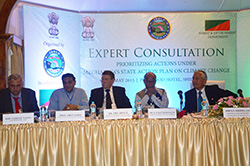
The Forest and Environment Department, Government of Meghalaya along with the Meghalaya Basin Development Authority with Technical Support from GIZ organised the “Expert Consultation Prioritizing Actions under Meghalaya’s State Action Plan on Climate Change (SAPCC)” on the 13th of May at Pinewood Hotel, Shillong. The Chief Guest at the event was Shri K. S. Kropha, Additional Chief Secretary to the Government of Meghalaya. Several leading experts on climate change from across the country graced the dais which includes Dr. N. H. Ravindranath, Professor, Centre for Sustainable Technologies, IISc, Bangalore, Dr. Sandhya Rao, Executive Director, INRM Consultants New Delhi, Prof. Amit Garg, IIM Ahmedabad, Dr. Vimal Mishra, IIT Gandhinagar, Dr, Rajiv Chaturvedi, Assistant Professor, IIT, Gandhinagar, Mr. Farhad Vania, Portfolio Management Advisor, GIZ and Dr. Uwe Scholz, Project Director: Climate Change Adaptation North Eastern Region of India, GIZ. The objective of hosting the event was for the purposes of sensitization and capacity building of officers from the sectoral departments, guidance on technical issues, prioritizing adaptation actions under SPACC, identifying areas of climate change, etc.
The welcome address was delivered by Dr. S. Ashutosh, APCCF, Government of Meghalaya. He stated at the beginning of the speech that “Climate Change has emerged as one of the most serious threats to mankind in the last 3 to 4 decades” and thus the future looks both grim and challenging. Populations depending on agriculture and natural resources would be most severely affected if climate change was ignored. He went on to say that unique factors in Meghalaya such as “mountainous terrain, high rainfall, vast forest and biodiversity, fragile geological formation, large number of rivers and streams, natural resource based economy and over 80% of the population living in villages depend on agriculture and natural resources for livelihood makes the state highly vulnerable to climate change.”
The next speaker was Prof. N. H. Ravindranath. He gave a brief presentation on Climate Change and Meghalaya”. He succinctly spoke on why Meghalaya should worry about climate change and listed some poignant points such as “the NE region is subjected to large current climate variability – year to year variation – NE region is subjected to frequent floods and droughts”, secondly “large scale climate change projected for NE region and Meghalaya has some of the most vulnerable districts.” He reiterated on the point that large dependence of local communities on natural resources & climate sensitive sectors has led to the degradation of natural resources. He also stressed on the point that climate change is an additional pressure on the North East Region. Mr. Ravindranath also briefly mentioned on the State Climate Change Action Plan for Meghalaya. He stated a few points such as the need for updating the SAP – just like IPCC is continuously updating based on improvement in science and modelling, availability of new climate model and multiple model climate projections to assess changes in temperature, rainfall distribution, floods and droughts. He also spoke on new improved impact models are available to assessment of Impact of CC on crop production, water resources, forests, etc amongst other things.
The introductory remark was presented by Dr. Uwe Scholz who inform the gathering of GIZ past assistance towards formulation of the SAPCC and expressed the readiness to provide any technical support that may be required towards implementation of priority areas within the SAPCC. He was pleased to inform that the project under GIZ would be extended till 2017, reaffirming the possibility of seeking additional funding from the German Ministries and other available donor for innovative climate change sensitive projects.
Mr. R. Mishra, CEO MBDA and Principal Secretary, Planning Department, Government of Meghalaya, was the next speaker and shared personal experiences on his observation of climate change and was deeply thankful to GIZ for their encouragement and guidance to set up a State Action Plan on Climate Change.
The last speaker was the Chief Guest, Mr. Kropha. He spoke fondly of how he wished Meghalaya and Shillong in particular would remain” a pleasant hill station” over the coming years and not suffer the consequences of climate change. He wished that it would remain a “tourists’ destination”. Mr. Kropha stated that it was extremely frightening to see the “change and evolution of weather patterns and precipitation” and he wondered how the ecosystem and people could adapt to such changes. This to him was the crux of studying climate change. It is incumbent on us to “learn and adapt” to such climate changes so as not to pose a threat to us.